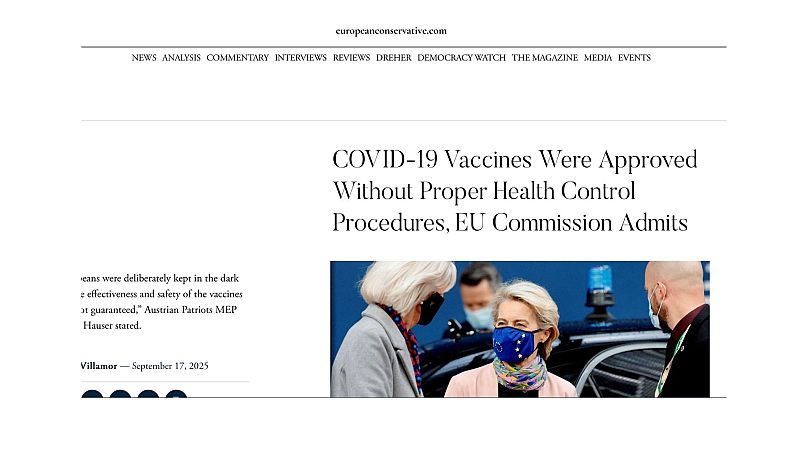The approval of COVID-19 vaccines may have been fast-tracked, but these medicines were still subject to rigorous checks carried out by regulatory authorities.
A wave of social media posts has misleadingly interpreted a recent statement made by the European Commission, framing it as a bombshell admission that COVID-19 vaccines were passed without proper checks.
 ADVERTISEMENT
ADVERTISEMENT
 ADVERTISEMENT
ADVERTISEMENT
"Since 2020, we've been told that everything was secure, that everything had been tested. Now Mrs. von der Leyen and her Brussels technocrats have at last recognised that the authorisations for COVID-19 vaccines were handed on the basis of partial dossier,” a YouTuber named ‘CharbOfficiel’ said in a video which has been viewed more than 16,000 times.
To support his claim, the YouTuber cites an article published by German daily the Berliner Zeitung on 16 September 2025. It bears the headline "EU Commission admits: Corona vaccines were released without 'comprehensive' safety data.”
In its article, the Berliner Zeitung writes, "[the] EU Commission has admitted that the corona vaccines were administered to the population without sufficient safety data.”
It goes on to quote a question submitted to the European Commission by Gerald Hauser, who is an Austrian MEP from the far-right Patriots for Europe (PfE) group and a vocal critic of Europe's vaccine strategy.
In a series of questions focusing on the Comirnaty COVID-19 vaccine—developed by pharmaceutical groups BioNTech and Pfizer and the first to be approved in Europe—Hauser asked, "Why did the Commission not uphold the Treaty and inform citizens – as stated in the contract – that the efficacy and safety of the gene-based vaccine were not guaranteed?"
Misinterpreted data
In August, the Commission responded by stating that these vaccines were granted a "conditional marketing authorisation,” which gives the green light to medicines with "unmet medical needs whilst a comprehensive data dossier is not yet available.”
The Berliner Zeitung told EuroVerify that it used quotation marks around the word "comprehensive" in its headline, "precisely to indicate that the phrase is drawn from the Commission's own statement.”
Another media outlet, the European Conservative, also picked up on the Commission's response, publishing an article with the headline "COVID-19 Vaccines Were Approved Without Proper Health Control Procedures, EU Commission Admits."
The publication went on to accuse the Commission of concealing "essential information at the very moment when citizens were being asked for an act of mass trust."
In reality, the Commission's response is not a new "admission,” given that it is longstanding and public knowledge that the approval of COVID-19 vaccines was fast-tracked in light of the pandemic.
A Commission spokesperson told EuroVerify that the response it provided to Hauser had been misinterpreted in certain cases, specifying that conditional market authorisations allow medicines with "less comprehensive clinical data than normally required" to be greenlit.
Emergency authorisation
Conditional marketing authorisations are regulatory trade-offs that can be granted during public health emergencies, when the need for immediate vaccine access outweighs the risks of having all the available data.
The COVID vaccine is not an exception. For instance, the Ebola vaccine was granted a conditional marketing authorisation in 2019 during the epidemic, before receiving a full one in 2021.
"In the interest of public health, applicants may be granted a conditional marketing authorisation for such medicines on less comprehensive clinical data than normally required, where the benefit of immediate availability of the medicine outweighs the risk inherent in the fact that additional data are still required,” a Commission spokesperson told Euronews.
"The obligations have since been fulfilled and the COVID-19 vaccines have been converted to full marketing authorisations,” added the Commission spokesperson.
Although COVID-19 vaccines were granted conditional marketing authorisations, they were not granted a blanket green light, as thousands of individuals participated in clinical trials as part of assessments carried out by the European Medicines Agency (EMA).
Once vaccines are granted full marketing authorisations, the EMA and the EU member states continue to monitor reports of suspected side effects with COVID-19 vaccines, meaning that authorisations can be revoked.
According to a study published in the Lancet Respiratory Medicine outlet, COVID-19 vaccines reduced deaths by 59% between December 2020 and March 2023, representing approximately 1.6 million lives saved.












